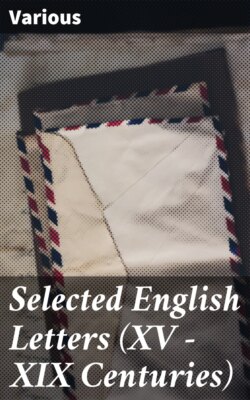Читать книгу Selected English Letters (XV - XIX Centuries) - Various - Страница 17
На сайте Литреса книга снята с продажи.
TO LEONARD PHILARAS, THE ATHENIAN
ОглавлениеTable of Contents
The blind poet[1]
Westminster, 28 Sept. 1654.
I have always been devotedly attached to the literature of Greece, and particularly to that of your Athens; and have never ceased to cherish the persuasion that that city would one day make me ample recompense for the warmth of my regard. The ancient genius of your renowned country has favoured the completion of my prophecy in presenting me with your friendship and esteem. Though I was known to you only by my writings, and we were removed to such a distance from each other, you most courteously addressed me by letter; and when you unexpectedly came to London, and saw me who could no longer see, my affliction, which causes none to regard me with greater admiration, and perhaps many even with feelings of contempt, excited your tenderest sympathy and concern. You would not suffer me to abandon the hope of recovering my sight; and informed me you had an intimate friend at Paris, Dr. Thevenot, who was particularly celebrated in disorders of the eyes, whom you would consult about mine, if I would enable you to lay before him the causes and the symptoms of the complaint. I will do what you desire, lest I should seem to reject that aid which perhaps may be offered me by Heaven. It is now, I think, about ten years since I perceived my vision to grow weak and dull; and at the same time I was troubled with pain in my kidneys and bowels, accompanied with flatulency. In the morning, if I began to read, as was my custom, my eyes instantly ached intensely, but were refreshed after a little corporeal exercise. The candle which I looked at, seemed as it were encircled with a rainbow. Not long after the sight in the left part of the left eye (which I lost some years before the other) became quite obscured, and prevented me from discerning any object on that side. The sight in my other eye has now been gradually and sensibly vanishing away for about three years; some months before it had entirely perished, though I stood motionless, everything which I looked at seemed in motion to and fro. A stiff cloudy vapour seemed to have settled on my forehead and temples, which usually occasions a sort of somnolent pressure upon my eyes, and particularly from dinner till the evening. So that I often recollect what is said of the poet Phineas in the Argonautics:
A stupor deep his cloudy temples bound,
And when he walked he seemed as whirling round,
Or in a feeble trance he speechless lay.
I ought not to omit that while I had any sight left, as soon as I lay down on my bed and turned on either side, a flood of light used to gush from my closed eyelids. Then, as my sight became daily more impaired, the colours became more faint and were emitted with a certain inward crackling sound; but at present, every species of illumination being, as it were, extinguished, there is diffused around me nothing but darkness, or darkness mingled and streaked with an ashy brown. Yet the darkness in which I am perpetually immersed seems always, both by night and day, to approach nearer to white than black; and when the eye is rolling in its socket, it admits a little particle of light, as through a chink. And though your physician may kindle a small ray of hope, yet I make up my mind to the malady as quite incurable; and I often reflect, that as the wise man admonishes, days of darkness are destined to each of us, the darkness which I experience, less oppressive than that of the tomb, is, owing to the singular goodness of the Deity, passed amid the pursuits of literature and the cheering salutations of friendship. But if, as is written, 'Man shall not live by bread alone, but by every word that proceedeth from the mouth of God,' why may not any one acquiesce in the privation of his sight, when God has so amply furnished his mind and his conscience with eyes? While He so tenderly provides for me, while He so graciously leads me by the hand, and conducts me on the way, I will, since it is His pleasure, rather rejoice than repine at being blind. And, my dear Philaras, whatever may be the event, I wish you adieu with no less courage and composure than if I had the eyes of a lynx.
[Footnote 1: From the Latin.]
